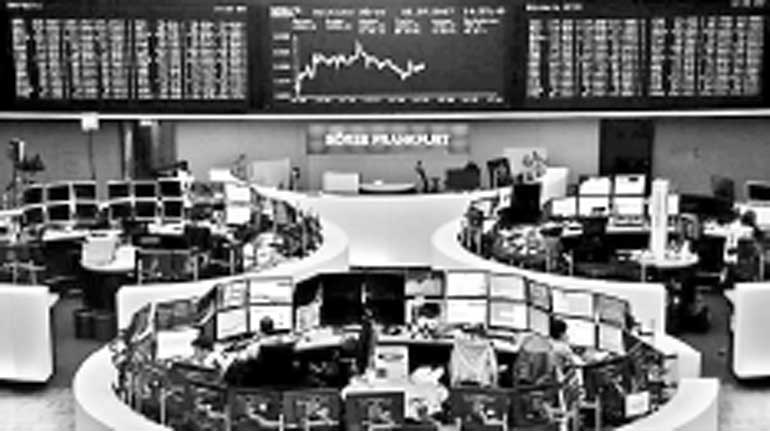Wednesday Feb 18, 2026
Wednesday Feb 18, 2026
Saturday, 29 July 2017 00:09 - - {{hitsCtrl.values.hits}}
 TOKYO (Reuters): Asian stock markets sagged on Friday after U.S. tech shares retreated from recent rallies, though optimism about U.S. corporate earnings and the global economy underpinned overall sentiment.
TOKYO (Reuters): Asian stock markets sagged on Friday after U.S. tech shares retreated from recent rallies, though optimism about U.S. corporate earnings and the global economy underpinned overall sentiment.
European shares were expected to open lower, with spread-betters looking for Germany’s DAX to fall 0.7% and Britain’s FTSE to drop 0.6%.
MSCI’s broadest index of Asia-Pacific shares outside Japan fell 1.1%, erasing almost all of its weekly gains, with Samsung Electronics, Asia’s largest company by market capitalisation, dropping 4.4%.
Japan’s Nikkei shed 0.6%.
On Wall Street, the Dow industrials set a record closing high, helped by a 7.7% jump in Verizon following the top U.S. wireless carrier’s quarterly earnings.
But investors were spooked by a sudden drop in technology and transportation shares. The S&P 500 technology sector fell 2.0% at one point before ending the day down 0.8%.
After the bell, Amazon.com shares – up nearly 40% this year – fell 3.0% after the online retailer reported a slump in profits, which helped drag U.S. stock futures down 0.3% in Asia.
“U.S. hi-tech shares have seen a spectacular rally in the past month. Few investors would have imagined that. I think it is quite natural to see some profit-taking in the short term,” said Hirokazu Kabeya, chief global strategist at Daiwa Securities.
Still, overall, investors’ sentiment remained solid on the back of upbeat corporate earning results and a bright global economic outlook.
“Given the Dow is hitting a record high, it’s hard to think market sentiment has suddenly changed,” said Masahiro Ichikawa, senior strategist at Sumitomo Mitsui Asset Management.
The S&P 500 index is on track to post back-to-back, double-digit quarterly earnings growth for the first time in almost six years.
U.S. durable goods orders, released on Thursday, surged 6.5% last month, the biggest gain in three years
The bullish report came on the eve of the government’s advance second-quarter gross domestic product estimate on Friday.
Economists expect the data to show growth picking up to 2.6% from 1.4% in January-March.
Japanese economic data released on Friday came in stronger than expected, with household spending rising more than forecast and the jobless rate unexpectedly falling.
MSCI ACWI, a gauge of the world’s 47 stock markets in dollar terms, hit a record high on Thursday, having gained 2.8% this month.
If the gains are sustained by Monday, it would mark the biggest monthly jump in a year, and the ninth consecutive month of increases – the longest such spell since 2003-04.
In the currency market, the dollar regained some footing after slumping to a 13-month low against a basket of major currencies the previous day when the U.S. Federal Reserve’s policy statement led to the perception that it has grown cautious about soft inflation.
The euro consolidated at $1.1691, after hitting a 2 1/2-year high of $1.1777 on Thursday.
The dollar eased 0.3% to 110.99 yen, a tad above Monday’s low of 110.625, its lowest in more than five weeks.
The dollar has been also pressured by doubts U.S. President Donald Trump could carry out his tax cut plans.
U.S. Senate Republicans failed to overturn the healthcare law known as Obamacare early on Friday, in a stinging blow to Trump as funding of his stimulus plan hinges partly on savings from healthcare reforms.
The biggest mover in the currency market was the Swiss franc, which fell 0.5% against the dollar and 0.6% versus the euro, due partly to expectations that the Alpine country is likely to keep easy monetary policy even as the European Central Bank looks to dial back its stimulus.
The euro broke out of its long-held range against the franc this week, rising to 1.1364 franc, its highest since the Swiss central bank had abandoned the peg of the Swiss currency to the euro in January 2015.
On the week, it is up 2.8%, also the biggest gain since early 2015.
Oil prices held near eight-week highs hit on Thursday, supported after key OPEC members pledged to reduce exports and the U.S. government reported a sharp decline in crude inventories.
Brent crude futures fetched $51.39 per barrel, down slightly in Asia after having climbed to $51.64 on Thursday.